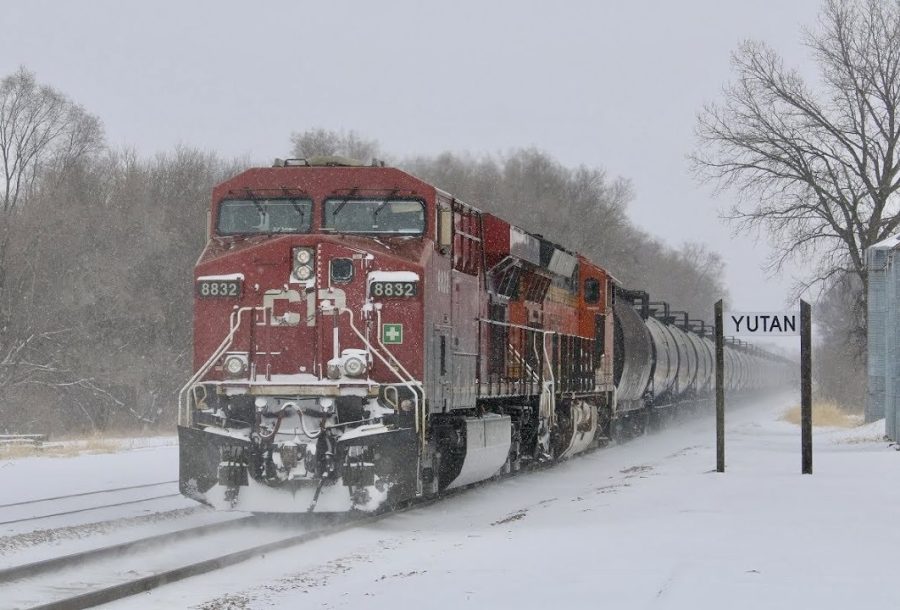Student opinion: Overworked conductors, engineers bring safety concerns
Twenty-four hours a day, seven days a week, trains transport goods of all kinds all across our country. Lots of times overlooked on these trains are a conductor and engineer who keep the train running smoothly and prevent potentially catastrophic accidents.
These conductors and engineers work difficult schedules that could potentially keep them up all night and away from home for days, affecting not only the workers but also their family members.
Currently, these men and women have to be available to work at a moment’s notice 75 percent of every month. One major rail company, Burlington Northern and Santa Fe Railway, is feeling the pressure of handling supply shortages across the country and is now asking the employees to raise the amount of time from 75 to 90-95 percent of the time. This means that the workers would have to be available to work almost all of the time along with the other life responsibilities they have.
To ensure that they keep themselves available to work, the BNSF employees run on a point system. They each get thirty points to start out when they join the job. Each time they are unavailable to work when called, they are docked points. If they get to zero points one time, they get a warning, and if it happens, again they are fired.
In order to rebuild points, employees would have to be available to work fourteen consecutive days. This becomes a difficult task to complete because time has to be taken off for appointments, illnesses, family duties and any other non-work-related activities. The ability to rebuild those points is an especially difficult process for those who suffer from work-related illnesses such as sleep disorders.
Many of the employees are often having to make the hard decision of taking time off for sickness or risking getting their co-workers sick. With all the illnesses that have been spreading, it would be right to take the time off, but their job makes it so they are put in a bad situation or unable to because of loss of points.
Health and amount of sleep for these employees have a big impact on the safety of the communities these trains travel through. Many of the trains that run behind Yutan High School carry oil and fuel. If an engineer or conductor were to fall asleep and collide with another train or object, there is a good chance of explosion.
Because of these new working conditions, the BNSF employees asked to strike because they feel that the changes to their work schedule could harm both the employees and the public, but the Railway Labor Act prevented the strike from happening.
This act, originally known as the Taft-Hartley Act of 1947, restricts the activities of labor unions. There is a process that the union and the company will go through together to try to come to a solution called arbitration, but it will take time.
Meanwhile, the BNSF employees are looking for ways to educate the public about these safety concerns. The employees are just trying their hardest to keep themselves and the communities as safe as possible.
At this point, word of mouth seems to be the best way to educate the public about this situation that affects many families in our community who have a member employed at BNSF, as well as those who live close to potentially dangerous train tracks. Hopefully, if enough pressure is put on the BNSF, they will reconsider their employees’ working conditions, keeping everyone safer.
Your donation will support the student journalists of Yutan High School. Your contribution will help cover our annual website hosting costs, as well as allow us to purchase equipment and produce more in-print editions.

Ellie is a junior and in her second year of journalism. She enjoys hanging out with family and friends and reading. Outside journalism, Ellie is involved...








Steve Hesse • Feb 28, 2022 at 11:00 pm
Great article. The only discrepancy I saw was that we don’t get a warning. The 1st time you hit 0 points, it is a 10 day suspension, the second time within the review period it is a 20 day suspension, and the 3rd time is termination. Last time e I heard, the review period is 2 years, but I did hear talk of reducing that to 1 year.
Dave Hallen • Feb 28, 2022 at 9:55 pm
Thank you for acknowledging what railroader is going through at the current time.
Helms Chris • Feb 12, 2022 at 9:23 am
Very well written and on point, I will share this and ask everyone to do the same.
Great Job Ellie
Michael Barges • Feb 10, 2022 at 10:49 pm
Nice Job , well written!
Liz Hopkins • Feb 10, 2022 at 6:16 pm
As a wife of a railroader, this is greatly appreciated! Yes! This affects so many people, and word of mouth is an effective method. Hoping the company gets enough pressure to rethink how they treat their employees! Thank you for your great article!
Robin Koozer • Feb 10, 2022 at 5:58 pm
Ellie: This is a very well-written opinion. Your research of the topic really supports your thesis. Very PROUD of you!
Uncle Robin
Dustin Slepicka • Feb 10, 2022 at 3:41 pm
Very good article!
P. K. Buck Owen • Feb 10, 2022 at 2:52 pm
Very well written. Good knowledge of both sides.
Good job!!
Mark Lloyd • Feb 10, 2022 at 1:22 pm
Thank you for writing about this Ellie. Very well written.